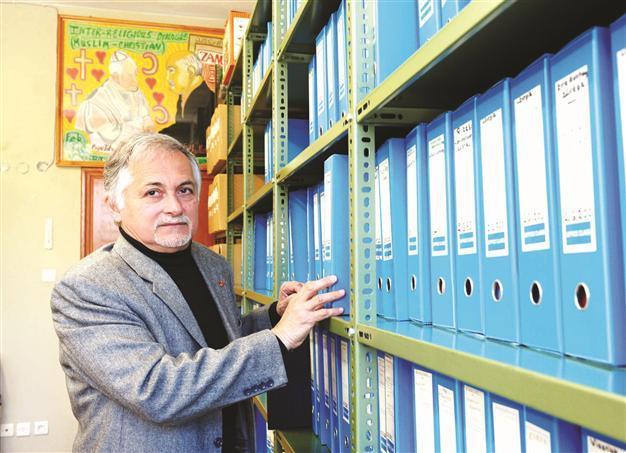Catholics hopeful over meeting on constitution
ISTANBUL - Hürriyet Daily News

Rinaldo Marmara is seen in the archieve room of Caritas Turkey. Behind him on the wall is a painting of a meeting between Pope John Paul II and Fethullah Gülen, leader of Gülen movement. DAILY NEWS photo, Emrah GÜREL
A Catholic Episcopalian spokesperson has expressed hope ahead of a groundbreaking meeting between representatives of Turkey’s Catholic community and Parliament’s Constitution Commission.“We have had problems with every government until the AKP [Justice and Development Party],” Rinaldo Marmara, the press spokesperson and cultural attaché for the Catholic Episcopalian Council of Turkey, recently told the Hürriyet Daily News. “Everything was taken away from us, but now there is a favorable attitude. I believe our problems will be resolved. We were always perceived as foreigners.
For that reason we never had the right to establish foundations like other minority communities.”
A delegation composed of Turkey’s Catholic leaders were invited to Ankara to speak with Parliament’s Constitutional Commission as part of efforts to pen a new constitution, marking a first in Turkey’s republican history. Representatives of the country’s Catholic community will request legal status for their institutions at the meeting.
“We, the Catholics living in Turkey, have an entirely foreign status. Our institutions bear no legal identity,” said Marmara, who is also a historian and the director of Caritas Turkey.
The Catholic community owns around 200 properties in Anatolia besides its estates in Istanbul, even though they hold no rights over them, Marmara said.
“We bear no legal identity or status. For that reason, our churches have been registered to clerics or the Virgin Mary, Jesus Christ and the saints. When the clerics die, [ownership of] our churches can pass onto their heirs,” he said.
Marmara also said they had informed the Vatican of recent developments pertaining to their scheduled meeting with the commission and that it was very well received there. “Minority foundations were registered in a 1936 declaration, whereas we were left with a treaty signed in 1913 between Sait Halim Paşa and the Vatican [during the Ottoman period],” he added. Turkey’s minority communities handed over a declaration detailing their real properties in 1936 upon the government’s request. Over the years, however, many of these properties did not remain registered under the foundations’ names and some were even sold to third parties.
















